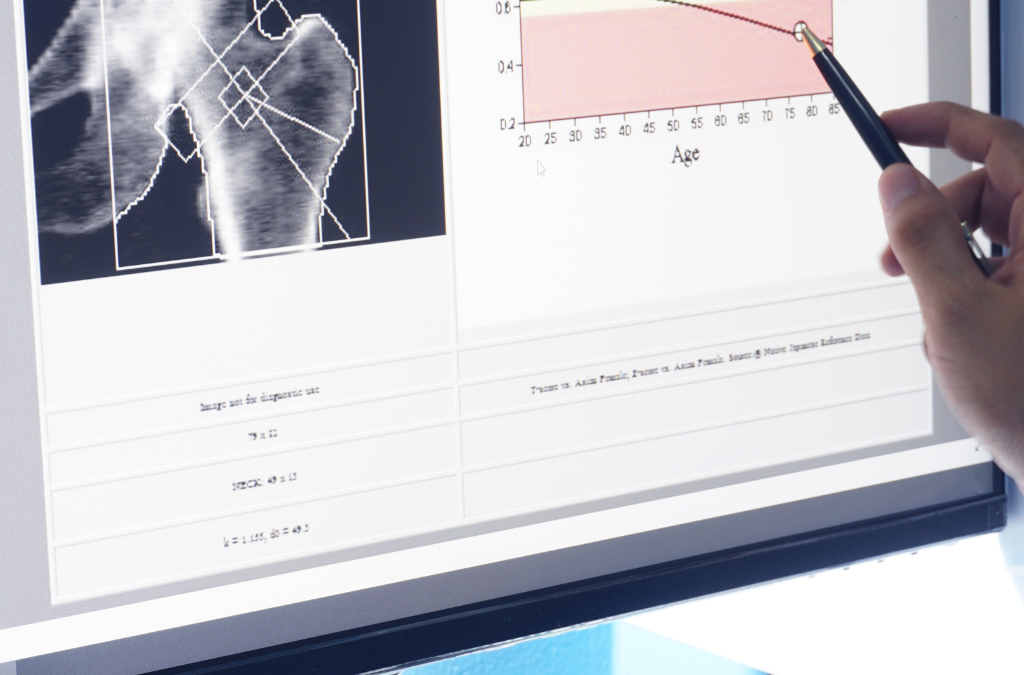Osteoporosis Detection and Prevention
The Point When It’s Too Late
Gwen was getting out of bed when it happened. A simple twist, a misstep, and then excruciating pain in her hip told her something was wrong. A trip to the ER confirmed it—a fracture. Worse, it revealed something she had no idea was lurking beneath her skin all this time: osteoporosis.
For Gwen and countless other women, the first time they hear the word “osteoporosis” is after they’ve already suffered a fracture. By then, it’s no longer about prevention; it’s about managing the damage. But it doesn’t have to be this way.
Osteoporosis is like a silent thief, stealing bone density slowly and quietly. For women going through menopause, the loss of estrogen accelerates this process, leaving bones weaker and more prone to breaking. But there’s good news—we now know how to detect it early and, better yet, how to prevent it.
What Happens to Your Bones During Menopause
Think of bones as living structures constantly remodeled by two types of cells. One type, called osteoclasts, works like demolition crews, breaking down old bone. The other type, osteoblasts, builds up new bone. When estrogen levels drop, as they do in menopause, this delicate balance is thrown off. Osteoclasts kick into overdrive, breaking down more bone than your body can rebuild. Over time, this leads to weaker, thinner bones, meaning they’re much more likely to break. Learn more details about the bone remodeling process here.
The most common areas affected are the hip, spinal vertebrae, and wrist. A fractured hip could mean months of recovery, limited mobility, and in some cases, permanent loss of independence. But the solution lies in spotting these issues before they get to that point.
How to Protect Your Bone Health
You don’t have to wait for a fracture to take action. Empower yourself with these proven strategies to maintain stronger bones and prevent osteoporotic damage.
Get Screened Early
The single most important thing any woman can do is get screened early. A special type of X-ray called a DEXA scan can measure bone density and detect even minor signs of weakening. Don’t wait until you notice symptoms because osteoporosis typically has none until a fracture occurs. Here’s why screening is critical for early detection of osteoporosis.
Strengthen Your Diet
Your bones thrive on calcium and vitamin D.
- Calcium: Aim for 1,200 mg daily. Leafy greens, dairy products, and fortified plant milk are excellent sources.
- Vitamin D: This helps your body absorb calcium. Sunlight exposure or supplementation can help ensure you’re getting enough. Aim for at least 600–800 IU daily. Read about nutritional needs for stronger bones.
Keep Moving
Bones stay strong with regular use. Incorporate weight-bearing exercises like walking, jogging, or dancing and resistance exercises like yoga or weight training. These activities stimulate bone growth and improve balance, reducing your risk of falls.
Avoid Smoking and Limit Alcohol
Smoking accelerates bone loss, and excessive alcohol makes you more vulnerable to fractures. Cutting back or quitting altogether can drastically improve your bone health.
Consider Medical Options
- Supplements: Calcium and vitamin D supplements can fill gaps in your diet.
- Medications: Drugs like bisphosphonates slow bone breakdown and reduce fracture risks.
- Hormone Replacement Therapy (HRT): For some women, replacing lost estrogen can help preserve bone density. Find out about treatment options for osteoporosis.
Start Asking the Right Questions
Far too many women find out about osteoporosis after they’ve already experienced a fracture. Don’t be one of them. Take charge of your health by addressing this now.
When you visit your doctor, ask the following questions to assess their understanding and treatment of menopause-related bone loss:
- “Should I get a DEXA scan to screen for osteoporosis?”
- “What steps can I take now to protect my bone health?”
- “Does my history put me at higher risk for fractures?” Find out what puts you at a higher risk.
- “What are my options for medications to prevent bone loss?”
- “How will my menopause treatment impact my bone health?”
- “Can you refer me to a specialist or recommend any resources for further support and information?”
It’s important to be proactive and advocate for your health. Don’t wait until it’s too late. Ask these questions and make sure you’re taking all necessary measures to protect your bones during menopause.
Find out how to find a menopause-literate doctor if you don’t already have one.
Remember, osteoporosis is a serious condition that can significantly impact your quality of life. Don’t underestimate its effects. Take action now to prevent or manage it during menopause.
Additionally, make sure you’re getting enough calcium and vitamin D in your diet, as these are crucial for strong bones. Talk to your doctor about supplements if needed. Learn about how to supplement and adjust your diet here.
Exercise remains key in improving bone health and preventing osteoporosis. Weight-bearing exercises, such as walking, jogging, or weightlifting, can help strengthen bones and reduce the risk of fractures.
Quitting smoking and limiting alcohol consumption also play a significant role in improving bone health during menopause. Both habits contribute to bone loss and increase the risk of osteoporosis.
It’s never too late to start taking care of your bones. By making small lifestyle changes and being proactive about bone health, you can maintain strong bones and reduce the risk of osteoporosis as you age.
Explore additional facts and prevention tips here.
Stay informed and stay empowered. Make bone health your priority today. You deserve to age with strength, independence, and resilience. Take action now, because the future of your bones depends on what you do today.
Join a community dedicated to transforming menopause care. Discover evidence-based insights and become a part of the movement for better health policies and support systems for midlife women.
